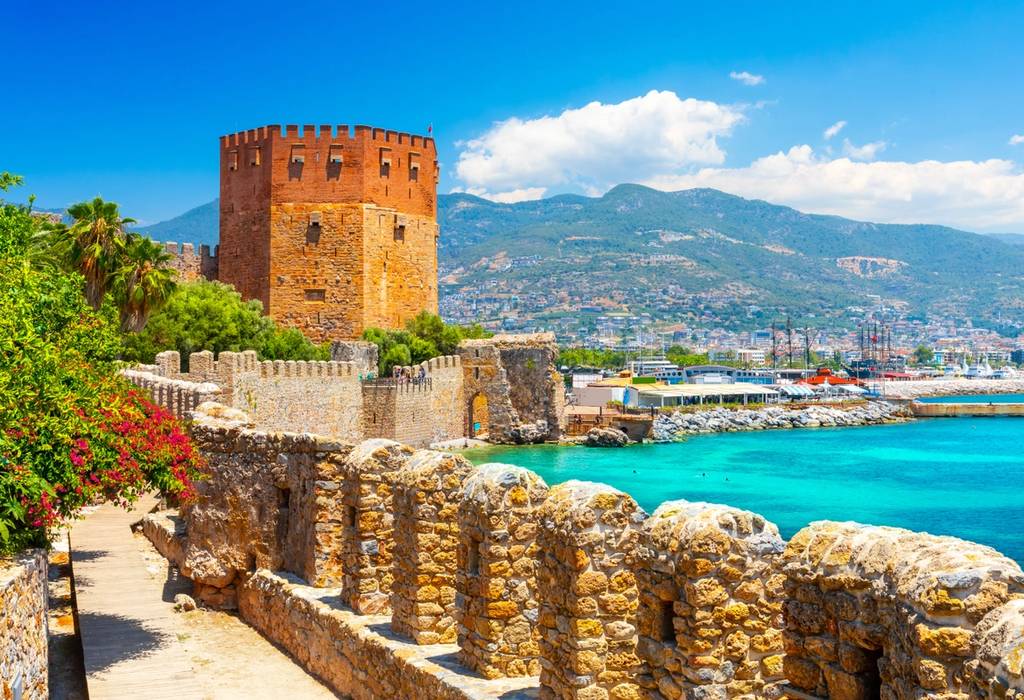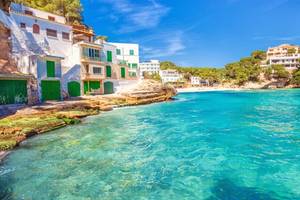European holiday destinations that use the euro and those that don't


10 May 20246 min read

Alanya, Turkey Excellent exchange rates make Turkey a top spot for cheap holidays.
Planning your next European holiday and want to know if those foreign coins you found down the back of the sofa will still buy you a drink? We've got you covered!
Whether you're looking for a Mediterranean beach holiday, a city break in a historic capital, or an adventure through the Alps, it's essential to know which countries accept the Euro and which don't. We'll also let you know the non-Euro countries where your pounds stretch furthest and which are more pricey.
Which countries have the Euro?


The Euro is the official currency of 20 European Union (EU) countries, collectively known as the Eurozone. Here's a breakdown of the countries that use the Euro and those that don't.
Countries using the Euro in 2024:
- Austria
- Belgium
- Croatia (joined in 2023)
- Cyprus
- Estonia
- Finland
- France
- Germany
- Greece
- Ireland
- Italy
- Latvia
- Lithuania
- Luxembourg
- Malta
- Netherlands
- Portugal
- Slovakia
- Slovenia
- Spain
Additionally, several microstates and territories also use the Euro:
- Andorra
- Kosovo
- Monaco
- Montenegro
- San Marino
- Vatican City
These territories also use the Euro as their currency:
- French Guiana
- Guadeloupe
- Martinique
- Mayotte
- Réunion
- Saint Barthélemy
- Saint Martin
- Saint Pierre et Miquelon.
Countries without the Euro where your pounds go further


Poland – Polish Złoty (PLN)
Generally more affordable for UK tourists due to favourable exchange rates. Eating out, accommodation, and entertainment are all reasonably priced. It’s easy to find a meal at a mid-range restaurant for as little as £10 - £15.
Czechia (Czech Republic) – Czech Koruna (CZK)
Prices are usually lower than Eurozone destinations. Prague is particularly popular for its charming architecture, affordable pints of beer (famously often under £2), and value-for-money accommodation.
Hungary – Hungarian Forint (HUF)
Long a favourite for stag and hen holidays thanks to its cheap nights out, Hungary still offers excellent value due to low costs and favourable exchange rates. But it’s not all about the nightlife. The capital of Budapest is a top destination, where visitors can enjoy thermal baths, ruin bars, and hearty Hungarian cuisine without breaking the bank.
Romania – Romanian Leu (RON)
Romania remains affordable for UK tourists. The medieval towns of Transylvania, the Carpathian Mountains, and the Black Sea coast offer diverse attractions, often at half the price of similar destinations in Western Europe.
Bulgaria – Bulgarian Lev (BGN)
Bulgaria pegs its Lev to the Euro, providing stability, and it's known for offering some of the cheapest ski resorts and beach holidays in Europe. The Black Sea coast and picturesque mountains provide ample affordable holiday options.
Serbia – Serbian Dinar (RSD)
More affordable compared to Eurozone destinations. Belgrade's nightlife, the cultural city of Novi Sad, and skiing in the Kopaonik mountains provide budget-friendly alternatives to pricier European alternatives.
Turkey – Turkish Lira (TRY)
The Turkish Lira has plummeted over the past few years, making Turkey one of the most affordable destinations for UK travellers. In early 2020, 1 GBP was worth around 8 TRY, but by May 2024, 1 GBP is worth over 40 TRY. This means a meal in a mid-range restaurant can cost as little as £5 - £7, and luxurious resorts along the Turkish Riviera offer excellent value.
Albania – Albanian Lek (ALL)
Albania is gaining popularity due to its affordability and beautiful coastline. The Albanian Riviera, historic towns like Gjirokastër, and the lively capital Tirana provide a rich cultural experience at a fraction of the cost of other Mediterranean destinations; and the currency definitely helps with that.
Countries that don't have the Euro where your pounds will likely buy you less


Denmark – Danish Krone (DKK)
Denmark opted out of adopting the Euro and is generally more expensive due to the stronger Krone. Copenhagen is renowned for its culture and food scene but comes with a hefty price tag, with meals often costing £20 - £30.
Sweden – Swedish Krona (SEK)
Sweden is in the EU but not in the Eurozone, and can be pricier due to its strong economy. Stockholm is a beautiful but expensive city where even basic meals can cost upwards of £15.
Norway – Norwegian Krone (NOK)
Not part of the EU, Norway is generally costly due to the strong Krone. The country is famous for its breathtaking fjords, but its high cost of living means accommodation, dining, and transport are significantly more expensive than in the UK.
Iceland – Icelandic Króna (ISK)
High costs make Iceland one of the more expensive European destinations. Being a remote island nation means Iceland imports most of its goods, leading to higher prices for food, accommodation, and transport. However, the unique landscapes, geysers, and hot springs make it worth the expense.
Switzerland – Swiss Franc (CHF)
Switzerland is high-priced due to its strong economy and currency. Its ski resorts, luxury shopping, and dining are all enjoyed by the glitterati, but come with a premium, making it one of the most expensive destinations for UK travellers.
Are countries that don't use the Euro generally cheaper to visit, and why?


In general, countries that don't use the Euro tend to be more affordable due to favourable exchange rates and lower living costs. Eastern European nations like Poland, Hungary, Romania, and Bulgaria often provide better value because their local currencies (like the Polish Złoty and Hungarian Forint) have a favourable exchange rate against the British Pound.
The Czech Republic and Albania also offer excellent value. Croatia recently became a more expensive destination after adopting the Euro in 2023, as prices increased to align more closely with Eurozone standards.
Are there any countries where the Euro is accepted but not the official currency?
Yes, several non-EU nations and territories use the Euro despite it not being their official currency. Kosovo and Montenegro have adopted the Euro unilaterally, while Andorra, Monaco, San Marino, and Vatican City have formal agreements with the EU to use the Euro
How is the Euro compared to the Pound and are holidays in Eurozone nations more expensive than they used to be?
Right now, £1 gets you about 1.16 Euros. Back in the "good old days" of 2007, you could get 1.50 Euros for every Pound, which made European holidays super cheap. But after the 2008 financial crisis, things changed, and the Pound dropped to about 1.02 Euros, meaning less spending money for Brits in Europe.
The Pound recovered a bit by 2015, reaching around 1.40 Euros, but after the Brexit vote in 2016, it fell to about 1.10 Euros. During the Covid-19 crisis, the exchange rate stayed low. Recently, it's improved slightly to about 1.16 Euros, but holidays in Eurozone countries are still pricier than before.
To stretch your budget, consider visiting countries like Poland or Hungary, where the exchange rates are better for the Pound.
*Please note: all prices correct at time of writing.
Enjoyed this article? Why not share the love.
You may also like...
Sign up and save on your next holiday
Be a savvy traveller and get top deals to your inbox, expert travel advice and the chance to win holidays















